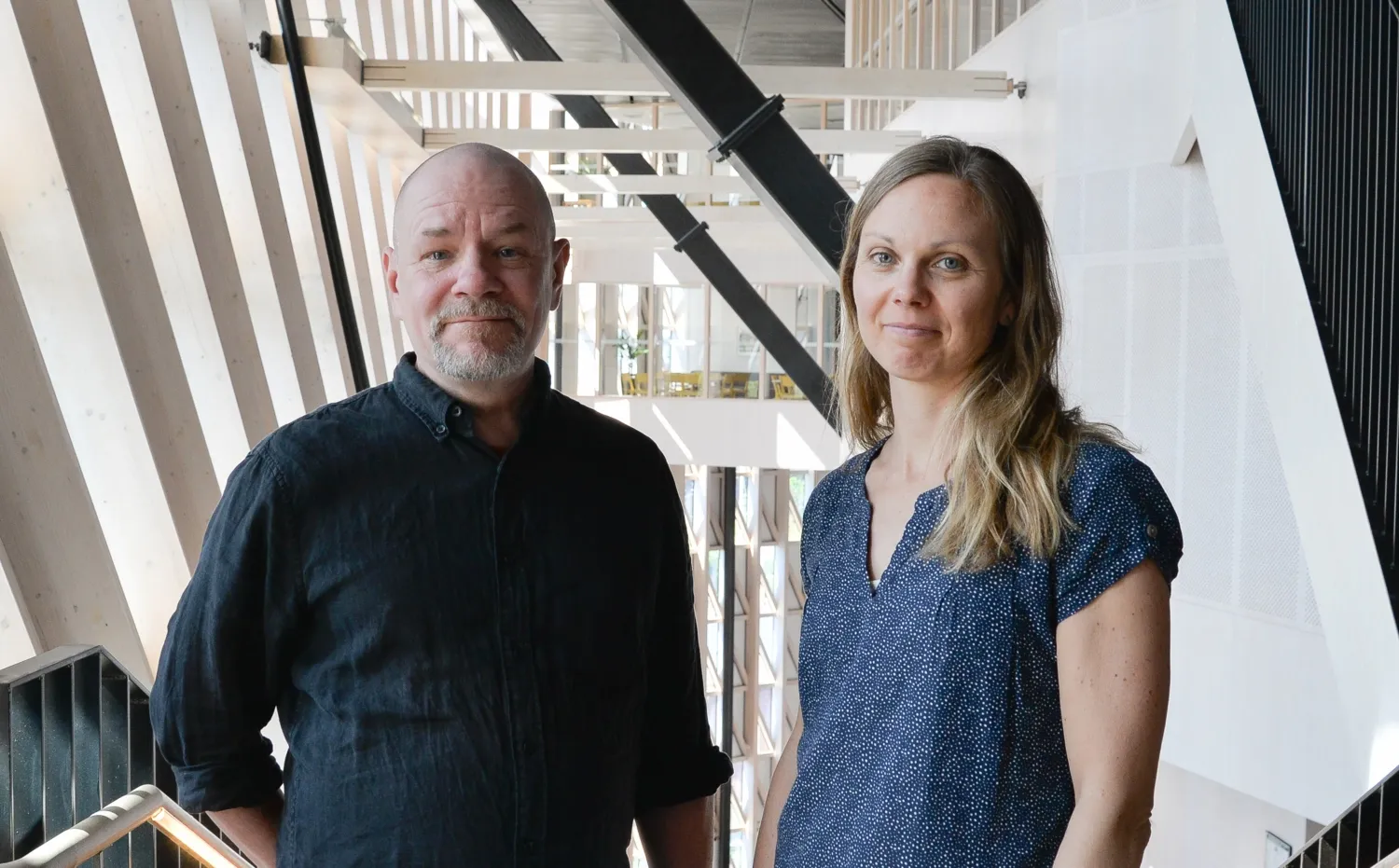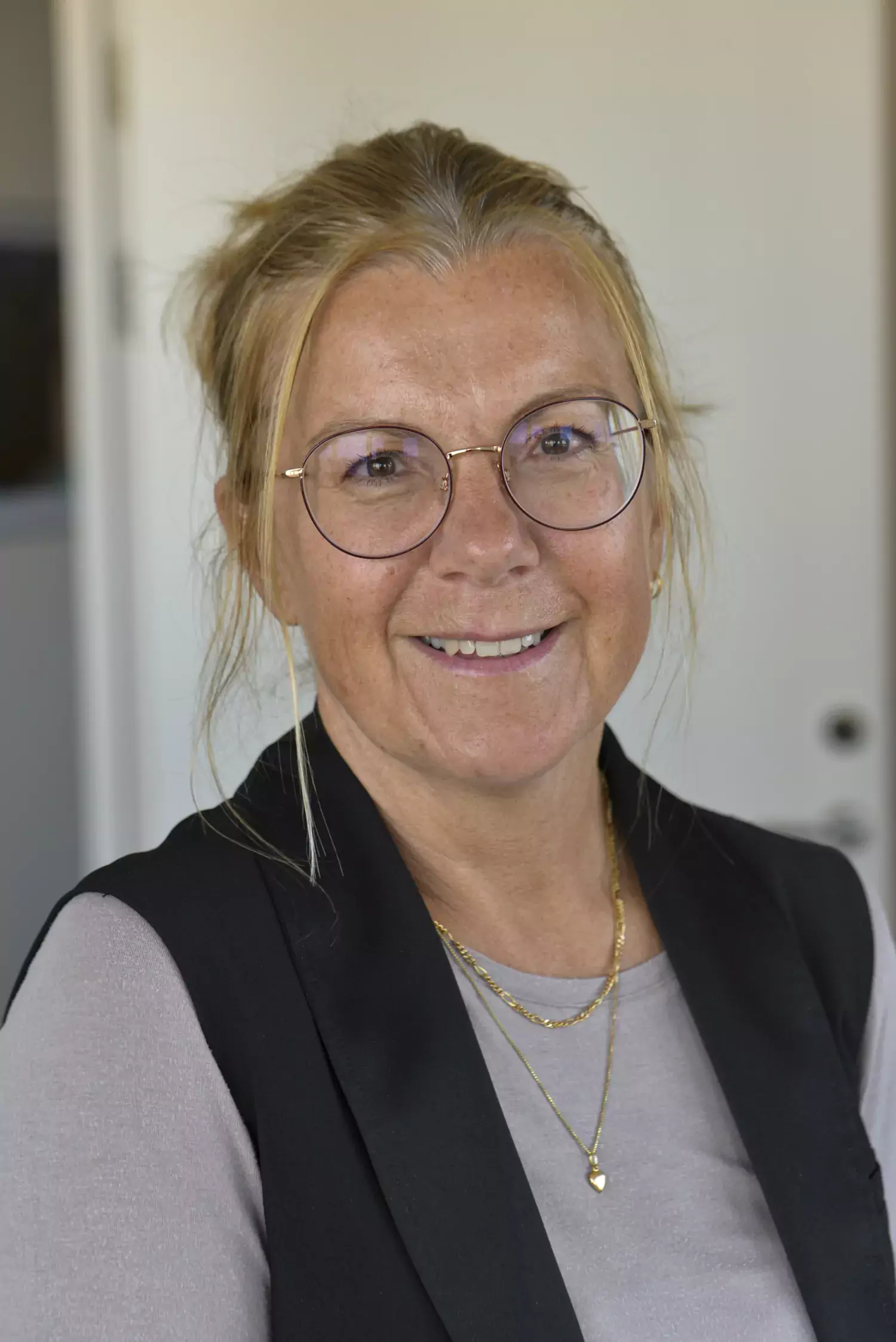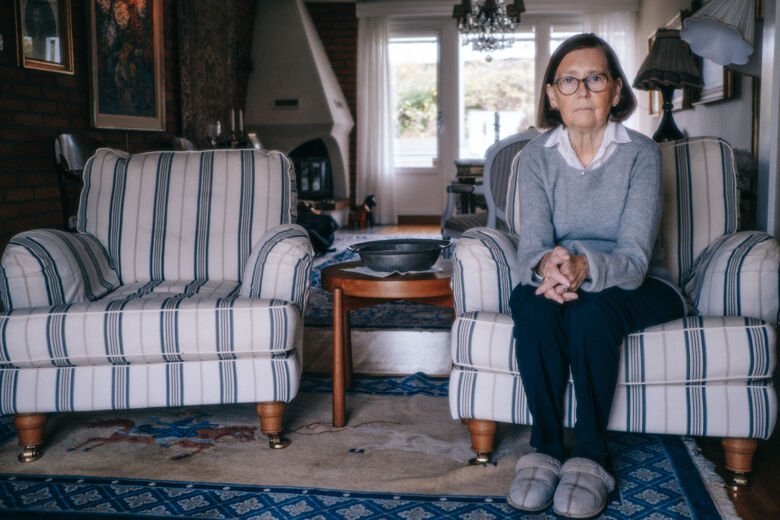 Photo: Björn Forslöw
Photo: Björn ForslöwMedicinvetarna #151: Do you understand what the doctor says?
Josefin Wångdahl, participates in KI's podcast Medicinvetarna, episode #151. She talks about her research on health literacy and why it is so important (in Swedish).

In our research on ageing and the living conditions of older people, we use cross-sectional and longitudinal data from interviews and registers. The research group is focusing on a number of research questions related to the physical and mental health of older adults, integrated health and social care, health literacy, family relationships and loneliness, as well as a number of aspects of group-level inequality.
 Photo: Björn Forslöw
Photo: Björn ForslöwJosefin Wångdahl, participates in KI's podcast Medicinvetarna, episode #151. She talks about her research on health literacy and why it is so important (in Swedish).
 Photo: Andreas Andersson
Photo: Andreas Andersson"Loneliness can be a problem for those who get very old, as many of their friends and loved ones have passed away". Carin Lennartsson is one of the researchers interviewed in KI’s podcast Medicinvetarna episode #100, on the topic "100-year-olds". The episode explores various aspects and consequences of the fact that more and more people are getting older (in Swedish).
 Photo: Elias Lauronen
Photo: Elias LauronenLoneliness is associated with poor health and mortality, but the causal relationships between loneliness, mental health and care use are note well understood. REALM takes a holistic perspective on loneliness in older age, how loneliness is understood and experienced, its relationship with mental health, and how loneliness can be identified, assessed and addressed by practitioners.
 Photo: N/A
Photo: N/AThe Swedish Panel Study of Living Conditions of the Oldest Old – SWEOLD, is an ongoing, nationally representative survey of the older population in Sweden, run by researchers from Aging Research Center at Karolinska Institutet. The first data collection was conducted in 1992, and has been repeated in 2002, 2004, 2011, 2014 and 2021. Older adults are asked questions about their actual living conditions in a number of areas relevant to older people, these include health, health and social care, financial resources, housing, occupation, and everyday activities. The survey also includes a few basic tests on physical and cognitive performance.
At present, our research covers different important areas of older adults’ living situation and health. Within the framework of intergenerational transfers of social and economic support in families, our research concerns how economic and social support are mutually exchanged between generations over the life course.
We also study health, health inequalities and health trends. This work is of major public health concerns, as the number of older adults increases in absolute and relative terms and life expectancy continues to increase. Our focus is on changing population health, and how the patterns vary across social groups, geographical areas, and time periods.
Another important line of our research concerns transitions that often occur later in life, such as retirement, loss of close relatives and deteriorating health and how these transitions are associated with people’s ability to ageing well.
Our research also involves quantitative analysis using both longitudinal and cross-sectional data. Being responsible for the SWEOLD study our research interests also cover the methodological challenges involved in studying the oldest old.
There is an ongoing demographic shift where both the number and proportions of older people are increasing. This development of ageing societies puts great pressure on the sustainability of welfare state.
During the last decades we have seen a retrenchment of the welfare state with, for instance, the downsizing of institutional eldercare which has placed more responsibility for eldercare on families. Although the welfare state is important for the wellbeing of individuals so are family relations. Family members distribute care and financial resources to each other over the life-course, making also past transfers important to consider.
The family transfers of care and financial resources may contribute to gender and socioeconomic inequalities, as families often allocate care duties to women and have varying amounts of resources available for providing transfers.
The aim is to study how inequalities are shaped and responded to by families through transfers of cash and care between older adults and their adult children and grandchildren. We will use long-term longitudinal and cross-cohort data to answer the following questions:
This project contributes to an understanding of the family’s role as a provider of care and financial resources and to the transmission of gender and socioeconomic inequalities across generations. This knowledge is crucial in policy and planning of welfare resources, with impact on both older people and younger generations.
Our research is part of an international collaborative research effort lead by research in Oslo called Inequalities in Ageing Well and the Importance of Transitions in Later Life (TRILL).
The TRILL project aims to study changes or transitions that often occur later in life such as retirement, loss of a close relative and deteriorating health and how these transitions affect people's ability to age well. The research has a gender, socioeconomic and geographical perspective. Within the TRILL project, we currently are studying the relationship between psychosocial work environment and retirement age, and whether the relationship depends on socioeconomic status or gender.
Will your child take care of you in your old age? Unequal caregiving received by older parents from adult children in Sweden.
von Saenger I, Dahlberg L, Augustsson E, Fritzell J, Lennartsson C
Eur J Ageing 2023 Apr;20(1):8
Physical functioning as a predictor of retirement: Has its importance changed over a thirty-year period in Sweden?
Eyjólfsdóttir HS, Agahi N, Fritzell J, Lennartsson C
Eur J Ageing 2022 Dec;19(4):1417-1428
Socioeconomic Life Course Models and Oral Health: A Longitudinal Analysis.
Celeste RK, Eyjólfsdóttir HS, Lennartsson C, Fritzell J
J Dent Res 2020 Mar;99(3):257-263
Trends and gender associations in social exclusion in older adults in Sweden over two decades.
Dahlberg L, McKee KJ, Fritzell J, Heap J, Lennartsson C
Arch Gerontol Geriatr 2020 ;89():104032
Trends and Inequality in the New Active Ageing and Well-Being Index of the Oldest Old: a Case Study of Sweden
Fritzell, J., Lennartsson, C., & Zaidi, A.
Journal of Population Ageing March 2021; 14(3)
How to Measure Retirement Age? A Comparison of Survey and Register Data.
Eyjólfsdóttir HS, Baumann I, Agahi N, Lennartsson C
J Popul Ageing 2021 ;14(2):143-161
Prolongation of working life and its effect on mortality and health in older adults: Propensity score matching.
Eyjólfsdóttir HS, Baumann I, Agahi N, Fritzell J, Lennartsson C
Soc Sci Med 2019 Apr;226():77-86
Social class and infirmity. The role of social class over the life-course.
Lennartsson C, Eyjólfsdóttir HS, Celeste RK, Fritzell J
SSM Popul Health 2018 Apr;4():169-177
Getting better all the time? Selective attrition and compositional changes in longitudinal and life-course studies
Kelfve, S., Fors, S., & Lennartsson, C.
Longitudinal and Life Course Studies 2017; Volume 8 Issue 1 Pp 104 –120
Data resource profile: The Swedish Panel Study of Living Conditions of the Oldest Old (SWEOLD).
Lennartsson C, Agahi N, Hols-Salén L, Kelfve S, Kåreholt I, Lundberg O, Parker MG, Thorslund M
Int J Epidemiol 2014 Jun;43(3):731-8
Our research focuses on loneliness among older adults and is undertaken in collaboration between Aging Research Center and Dalarna University.
Within the Research Programme on Ageing, Loneliness, and Mental Health: Understanding the Links and Enabling Change (REALM) focus is on loneliness among older adults, how loneliness is perceived and experienced, and its relationship to mental health. We will fill research gaps in order to promote evidence-based approaches to identifying, assessing, and addressing loneliness in practise by:
REALM is funded through a programme grant from The Swedish Research Council for Health, Working Life and Welfare (FORTE).
The project Causes and Actions of Late-life Loneliness (CALL) aims to:
CALL is funded by The Kamprad Family Foundation for Entrepreneurship, Research & Charity.
Our research focuses on how the health and social care system can meet the needs of an ageing population. We are studying equity in health and health care, the interaction between health and social care services and health literacy from an individual and organisational perspective.
We are interested in understanding how the health and social care system can meet the needs of an ageing population in a sustainable way. In one of our projects, we are exploring the interplay between health and social care services in terms of spending. By linking population-based registers to measures of care expenditure in the last year of life, we want to gain insight into how care resources are used and how expenditures in health care and social care are associated. This can help highlight resource-intensive areas and uncover inefficiencies at the border between health and social care.
We are also interested in understanding how to achieve a more integrated person-centred care. In a project about the life circumstances of first-time social health care users (65 years and older) we are combining health and social care data to better understand their need for coordination of care. We are also interviewing first-time social health care users about what lead to a decision on applying for social care and to what degree their expectations and needs were meet.
Being health literacy responsive as a health care professional is an important component of providing person-centred care. However, very little is known of the level of health literacy in the Swedish population. By combining both quantitative and qualitative approaches we are investigating the level of health literacy in the older population in Sweden, as well as older people experience of main barriers and facilitators for communicating with care providers and manage their health and care needs.
The project aim is to gain knowledge on HL in the older population. In this project we assess to what degree the older population in Sweden is health literate, identify groups that might face challenges due to inadequate HL and explore what older people experience as prerequisites for understanding health information and managing their health and care needs as well as communicate with caregivers.
The overall aim of the project is to increase the knowledge about what characterises the life circumstances of older people who are granted social care for the first time and to explore their experiences of how the services provided correspond to their needs and expectations. This project is done in collaboration with Äldrecentrum
The overarching aim of this project is to investigate the use of health and social care services from an expenditure perspective, to increase the knowledge of the interplay between different care resources and explore whether socio-demographic factors influence the use of care in the last year of life.
The overarching aim is to examine and identify possible challenges and effects (structure, quality, and satisfaction) of integrated care (available in Norrtälje municipality) and standard care (provided in Södertälje and Stockholm municipalities) in Region Stockholm.
The purpose of the study is to analyse how the local response to COVID-19 by health and social care services, among community living as well as in residential living, varies and impacts on mortality (in COVID-19 and total) and emergency health care utilization among older (aged 70+ years) persons in Norrtälje and Södertälje municipality and other selected municipalities and settings in Region Stockholm with different arrangements for care of older persons with greater health and social care needs.
The aim of this study is to understand the ideas, motives and driving forces behind the Swedish ageing in place policy and practice. How have the eligibility criteria and individual characteristics for being admitted to municipal institutional care changed over time and how has the length of stay in care homes changed in recent years?
Swedish Research Council
Postdoc in social gerontology studying older adults’ wellbeing in ongoing projects on loneliness and care needs.
Aging Research Center, Department of Neurobiology, Care Sciences and Society
Karolinska Institutet
SE-171 77 Stockholm
Tomtebodavägen 18 A, Widerström Building, floors 9 and 10
SE-171 65 Solna
PI’s at ARC: Johan Fritzell and Neda Agahi (leave of absence). Overall PI: Tine Rostgaard, Roskilde University and Stockholm University
We follow individuals 60+, after age-typical losses (loss of family member or physical functioning), across subgroups, birth cohorts and in different societal contexts (Sweden, Ireland, Poland, and Spain, in comparison with other European countries), and examine what may explain whether they return to their initial level of mental well-being or see a continuous decline. We argue that it is essential in ageing societies to understand the multi-factorial mechanisms behind the ability to bounce back.
Our approach enables a comprehensive understanding of psychosocial resilience. In the quantitative analyses, we use trajectory modelling to explore the heterogeneity and dynamics of resilience after age-related losses and link these trajectories to factors at micro-, meso- and macro-levels, in order to identify the mechanisms of protective factors.
We use longitudinal survey data with multiple follow-ups: the Swedish Level of Living Survey (LNU) and SWEOLD studies, and for the comparative analysis, the Survey of Health, Ageing and Retirement in Europe (SHARE) and the Irish TILDA study. The high response rates in SWEOLD allow for follow-ups of subgroups into very high ages while SHARE/TILDA data, with biannual follow-ups, allow analyses of cross-country variation and the influence of macro-level factors, such as participation and enabling environments, also using indicators from the Active Ageing Index (AAI).
In the qualitative approach, we investigate individual narratives of resilience in 4 countries which represent different welfare models and placements in the AAI. With analysis of policy context and qualitative interviews in each country, we explore differences and similarities in meanings of resilience, and aspects articulated as being central.
Our multi-national research team has excellent competences in both qualitative and quantitative analyses and we collaborate with senior and civil society organizations in the four countries who are part of implementation and dissemination of findings. The project is funded by the Swedish Research Council for Health, Working Life and Welfare and will run from 2022 until 2025.
PI: Johan Rehnberg
In Sweden, the Netherlands and other modern welfare states population health has improved; life expectancy has increased, and mortality rates decreased in all ages. However, inequalities in health have persisted or even increased. In other words, not everyone in societies with modern welfare states have benefited equally from improvements in population health. This project aims to examine the distribution of several risk factors for ill-health in the older population and examine how improvements in population health potentially leads to increased health inequalities. The results from this project will show whether there is a trade-off between improving health and reducing inequalities in old age. Such information is important for future policies aim to implement population wide preventive measures for risk factors that may or may not have unintended consequences for health inequalities.
PI: Johan Fritzell
The number and proportion of older persons in Sweden is skyrocketing. Already in 2020, the number of people 75 years and above will pass 1 million. To study and analyse living conditions and inequalities among older persons is therefore of utmost importance. We do this from a multidimensional perspective and against a background of worrying trends and differences in incomes at older ages. In contrast to most other EU-countries, Sweden has, according to Eurostat data, experienced increases of relative poverty, and has one of the largest gender gaps in income among older persons.
An overall aim of this project is to study if these trends are also apparent in more detailed and multidimensional analyses of welfare and living conditions among persons aged 75+. We will also use this perspective to advance the Active Ageing Index that was developed during European year of active ageing in 2012. We will incorporate the inequality dimension into the index but also make it more relevant for the oldest old. In one subproject, we will focus specifically on the income gradient in mortality among the older segments of the population. The income-mortality relationship has lately been studied intensely. However, despite the fact that the vast majority of all deaths in rich countries nowadays occur at old age these studies have rarely ever included persons above working-age.
PI: HwaJung Choi, co-investigator: Stefan Fors
PI: Johan Fritzell
This research program illuminates how life-long interplay between our socioeconomic conditions; our family situation, including inter-generational exchanges (of material and social support); and the health and social care system of the place we live shapes health and economic inequality later in life. We aim to provide evidence on the extent to which major welfare state institutions influence inequalities and on how to best combat inequalities via broad policy interventions.
The project has four parts. The first, Life-course influences on unequal living conditions, examines how childhood conditions and trajectories of education, employment, and health influence financial and health resources later in life. It also investigates the impact of working life disruptions (e.g., unemployment), family disruptions (e.g., divorce), and retirement on subsequent financial and health resources. The second, Inequality impact of health care and social services, examines whether changes in Sweden’s health and social care system have led to increasing inequalities among older people and their families. The third, Family as an institutional agent – influences within and across generations, studies the roles of gender, social class, and marital status in late-life inequalities. It also examines whether intergenerational transfers of money, time, and social support increase solidarity or inequality. The fourth, Combatting inequality: policy evaluation using comparative and quasi-experimental approaches, examines whether welfare state programs can influence inequality in mortality and health in the older segments of the population. It also investigates whether prolonged compulsory education has reduced a variety of later inequalities, particularly health inequalities related to parental social class.
We will use data from the Swedish Level of Living Survey, the Swedish Panel Study of Living Conditions of the Oldest Old, and multiple other sources, including but not limited to national Swedish registries, interviews with hospital patients, and European databases.